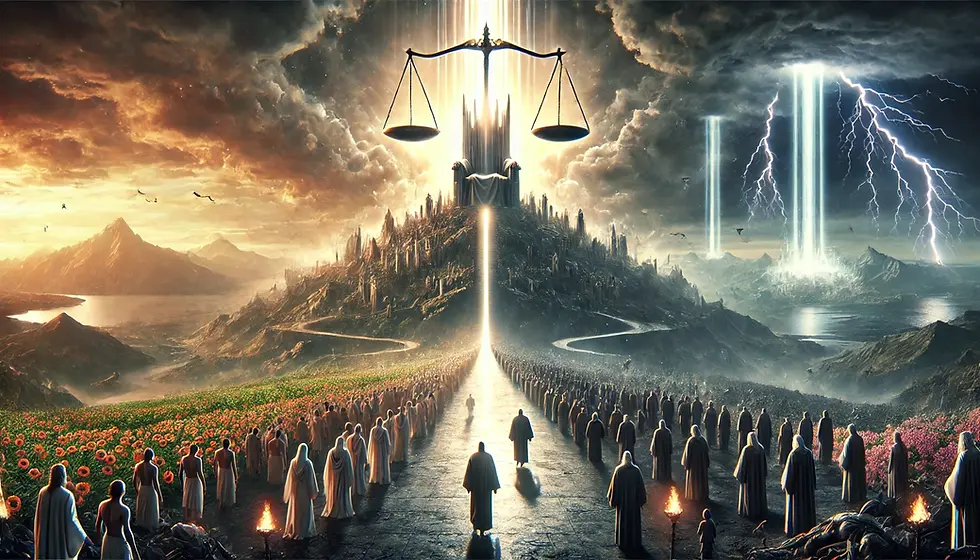The Creator and Sustainer of All Things – Romans 1:19–20; Acts 17:24–28
- Edward D. Andrews

- Jun 30, 2025
- 3 min read

Romans 1:19–20; Acts 17:24–28; Paul’s doctrine of divine transcendence and providence
Paul’s monotheism not only asserts that there is one God, but also defines this God as the Creator and Sustainer of all existence. Unlike the impersonal deities of pagan philosophy or the regional gods of polytheism, the God of Paul’s theology is both transcendent (above creation) and immanent (actively present within it), sovereignly upholding and directing all things in accordance with his divine will.
In Romans 1:19–20, Paul introduces his theology proper by grounding the universal accountability of humanity in the self-evident truth of divine creation:
“What can be known about God is evident among them, because God has made it evident to them. For his invisible attributes—his eternal power and divine nature—have been clearly seen since the creation of the world, being understood through what he has made. As a result, people are without excuse.”
Paul does not begin with speculative arguments or philosophical deductions; rather, he affirms that creation itself reveals the existence and nature of God. The phrase “clearly seen” (καθορᾶται) underscores the obviousness of God’s existence through the observable order, beauty, and complexity of the cosmos. God’s “eternal power” (ἀΐδιος αὐτοῦ δύναμις) and “divine nature” (θεῖοτης) are perceptible to all through general revelation. Thus, Paul affirms that the created order is not divine (contra pantheism), but it is a clear testimony to the divine—a window into the power and wisdom of the one true Creator.
In Acts 17:24–28, Paul extends this doctrine of creation into a robust theology of providence and sovereignty during his address at the Areopagus:
“The God who made the world and everything in it—he is Lord of heaven and earth—does not live in temples made by hands, nor is he served by human hands as though he needed anything, since he himself gives everyone life and breath and all things. From one man he has made every nationality… He did this so they might seek God… For in him we live and move and have our being.”
This declaration confronts and dismantles the flawed conceptions of deity held by the Athenian philosophers. The God Paul proclaims is:
Creator: “made the world and everything in it”
Sovereign Lord: “Lord of heaven and earth”
Self-sufficient: “not served by human hands, as though he needed anything”
Providential Giver: “gives everyone life and breath and all things”
Sustainer of life: “in him we live and move and have our being”
This passage reveals the transcendence of God—he is not bound by physical structures or dependent on human rituals—as well as his immanence—he is actively sustaining every breath, moment, and nation. The Creator is not absent; he is intimately involved in the unfolding of human history.
Paul’s assertion that God made “from one man” (ἐξ ἑνὸς) all nations directly affirms human unity and divine intentionality in history. Every boundary, every era, every rise and fall of kingdoms is under God's direction. This reflects not fatalism or determinism, but a divine orchestration that preserves human freedom within God’s overarching purposes (cf. Romans 11:33–36).
In Pauline theology, creation is not autonomous; it exists for God and by his sustaining power. There is no room for dualism or deism. The universe is not divine, yet it is deeply dependent on the divine. All things—both seen and unseen—are held together by the will and word of the Creator (cf. Colossians 1:16–17).
Thus, Paul’s view of God as Creator and Sustainer affirms:
The intelligibility and order of the universe
The accountability of all people to their Maker
The sufficiency of general revelation to condemn unbelief
And the continued involvement of God in history, directing it toward the fulfillment of his redemptive purpose in Christ
God is not silent. Every tree, every breath, every movement is evidence of his active hand. This is not myth or metaphor—this is the foundation of reality.
About the Author
EDWARD D. ANDREWS (AS in Criminal Justice, BS in Religion, MA in Biblical Studies, and MDiv in Theology) is CEO and President of Christian Publishing House. He has authored over 220 books. In addition, Andrews is the Chief Translator of the Updated American Standard Version (UASV).




Comments